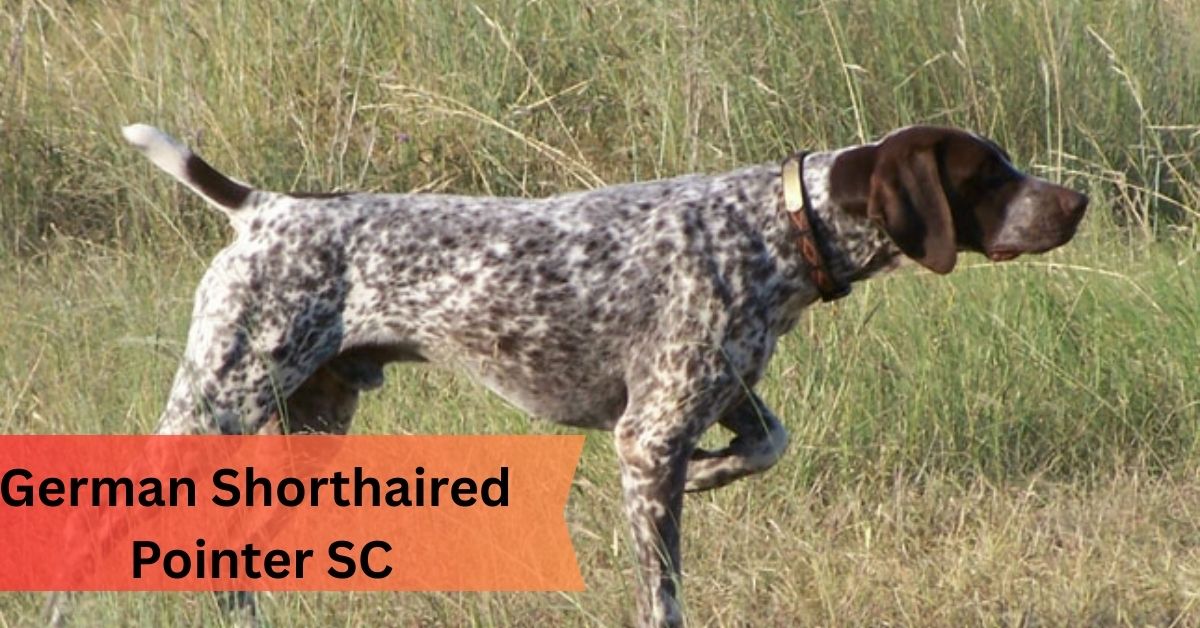Owning a German Shorthaired Pointer SC has been one of the best decisions of my life. From day one, I was amazed by its energy, intelligence, and affection. My German Shorthaired Pointer SC quickly became my running partner and loyal friend at home. What I love most is the balance between adventure and companionship. Truly, life feels brighter with a German Shorthaired Pointer SC by my side.
The intelligent, athletic, and devoted German Shorthaired Pointer SC is a multipurpose breed. The German Shorthaired Pointer SC, who thrives in active homes, is renowned for being a loyal family companion and an excellent hunting partner. The German Shorthaired Pointer SC can be a dependable lifetime friend in addition to being a pet with the right training, exercise, and attention.
History of the German Shorthaired Pointer SC:
The German Shorthaired Pointer SC has its roots in 19th-century Germany. Breeders were focused on developing a hunting dog that could work on land and in water, capable of tracking, pointing, and retrieving. To achieve this, several breeds were carefully crossed, including the old Spanish Pointer, various scent hounds, and other hunting dogs.
The breed had evolved into the smart and athletic dog of today by the late 1800s. In 1930, the German Shorthaired Pointer was recognized by the American Kennel Club. It has since grown to be among the most well-liked sporting breeds both domestically and internationally.
The term SC in German Shorthaired Pointer SC often refers to Sporting Companion, highlighting its dual purpose as both a skilled hunting dog and a loving family member.
Appearance and Characteristics:
The German Shorthaired Pointer SC is built with style and strength. Its physique is sleek and athletic, and it ranges in size from medium to giant.
- Average height is between 21 to 25 inches
- Average weight ranges from 45 to 70 pounds
- The coat is short, smooth, and water-resistant
- Solid liver, white, liver and white, and liver roan patterns are among the coat hues.
- The eyes are almond-shaped and expressive, often dark brown in color
- The breed has webbed feet that help it swim effectively
This dog has a graceful appearance but also displays strength and endurance. Its overall look reflects the balance of a true sporting dog.
Temperament and Personality:
The German Shorthaired Pointer SC is admired for its affectionate, loyal, and intelligent nature. These dogs form strong bonds with their families and often want to stay close to their owners, earning them the nickname “velcro dogs.”
They are energetic, playful, and enthusiastic, which makes them excellent companions for active families. However, they may become restless or destructive if they do not receive enough physical activity and mental stimulation.
1. Energy and Activity Level:
The German Shorthaired Pointer SC is one of the most energetic dog breeds. Daily exercise is essential, and owners should be prepared to provide at least one to two hours of vigorous activity such as running, hiking, swimming, or agility training.
2. Trainability:
Because of their intelligence and eagerness to learn, this breed makes training fun for both the owner and the dog. Praise and treats are the most effective forms of positive reinforcement. However, training needs to begin early and be persistent due to their tremendous prey drive.
Caring for a German Shorthaired Pointer SC:

Source: dailydogtag
1. Grooming and Care:
Despite their athletic nature, grooming the German Shorthaired Pointer SC is relatively simple.
- In most cases, brushing once a week is sufficient to control shedding.
- Regular nail trimming is necessary to prevent discomfort
- Ears should be checked and cleaned to avoid infections
- Dental care, including brushing teeth or providing dental chews, helps maintain oral health
Since they have short coats, bathing is only needed occasionally or after outdoor adventures.
2. Diet and Nutrition:
Feeding a German Shorthaired Pointer SC requires attention to quality and balance. As a highly active breed, it needs a protein-rich diet to maintain muscle strength and energy.
High-quality dry or wet dog food with essential nutrients is recommended. Owners should avoid overfeeding, as this breed is prone to obesity if its energy output does not match its food intake. Splitting meals into two portions per day helps maintain steady energy levels.
3. Exercise Requirements:
The German Shorthaired Pointer SC thrives on physical activity. This breed is not suitable for owners who prefer a sedentary lifestyle.
Examples of activities they enjoy include:
- Running or jogging alongside their owners
- Playing fetch with a ball or frisbee
- Swimming and water retrieving games
- Participating in agility or obedience competitions
Without enough activity, the breed may show unwanted behaviors such as chewing, digging, or excessive barking.
Health and Lifespan:
With a lifespan of 12 to 14 years, the German Shorthaired Pointer SC is a typically healthy breed. But it’s crucial to understand frequent health problems:
- Hip dysplasia, which may result in pain and trouble moving around
- Bloat or gastric torsion is a potentially fatal condition that requires immediate treatment.
- Eye disorders such as cataracts or progressive retinal atrophy
- Epilepsy in some cases
Routine veterinary visits, vaccinations, and preventive care are crucial for maintaining the health of this breed.
Living with a German Shorthaired Pointer SC:
1. Compatibility with Families:
These dogs are affectionate and protective, making them excellent companions for families. They usually do well with children, although supervision is recommended with very young kids due to the breed’s high energy.
2. Relationship with Other Pets:
German Shorthaired Pointers can live peacefully with other dogs if socialized early. However, their hunting instincts may make them less suitable for households with smaller pets such as rabbits or birds.
3. Ideal Living Environment:
They do best in homes with large yards or access to outdoor space. Apartment living is possible, but only if the owner is committed to providing daily exercise.
Pros and Cons of the Breed:
Pros:
- Loyal and affectionate with families
- Intelligent and trainable
- Low grooming needs
- Excellent for active lifestyles and outdoor adventures
Cons:
- Requires very high levels of exercise
- May chase smaller animals due to prey drive
- Can become destructive if under-stimulated
- Not suitable for sedentary households
Training Tips:
The German Shorthaired Pointer SC should be trained with patience and persistence. A well-rounded adult dog is developed through early socialization with people and other dogs.
Common difficulties include pursuing animals, biting objects, and leaping up on people. These can be controlled by giving them lots of mental stimulation and teaching them obedience. Advanced training exercises and puzzle toys are also beneficial.
Cost of Ownership:

Source: hightowerwestchester
Owning a German Shorthaired Pointer SC involves several expenses:
- Purchase or adoption fee ranges from 600 to 1500 dollars
- Annual food and supplies may cost between 800 to 1200 dollars
- Veterinary care typically ranges from 300 to 700 dollars annually
- Training, grooming, and activity costs add extra expense
The overall investment is worthwhile for those who can meet the breed’s needs.
Frequently Asked Questions:
1. How much should I pay for a German Shorthaired Pointer?
The price of a German Shorthaired Pointer puppy usually ranges from $600 to $1,500, depending on the breeder’s reputation and lineage. Well-bred dogs from champion bloodlines may cost more.
2. What are the negatives of German Shorthaired Pointers?
While the German Shorthaired Pointer is loyal and energetic, its high exercise needs, strong prey drive, and tendency to become destructive if bored can be challenging for first-time owners.
3. In German Shorthaired Pointers, what is the most common cause of death?
The most common cause of death for German Shorthaired Pointers is cancer, which is followed by heart disease and bloat. A healthy lifestyle and routine veterinary examinations can help them live longer.
4. What two breeds make a GSP?
The German Shorthaired Pointer was created by crossing the Spanish Pointer with German scent hounds, later refined with English Pointers to achieve the versatile hunting and family dog we know today.
5. Do GSPs bark a lot?
A German Shorthaired Pointer is not usually a heavy barker, but it will bark when bored, anxious, or trying to alert its family. Training and exercise help manage excessive barking.
6. Is a GSP a good inside dog?
The German Shorthaired Pointer can be an inside dog if given enough daily exercise and mental stimulation. Without activity, it may become restless and unhappy indoors.
7. Do GSP dogs like to cuddle?
Yes, the German Shorthaired Pointer loves affection and is often described as a “velcro dog.” They enjoy cuddling with their family after a long day of activity.
8. Do GSPs have an off switch?
The German Shorthaired Pointer is known for high energy, but after proper exercise, they do have an “off switch.” They enjoy relaxing at home and being close to their family.
9. Is a male or female German Shorthaired Pointer better?
German Shorthaired Pointers are excellent companions for both sexes. While ladies may be a little more subdued and autonomous, males are frequently more gregarious and fun.
10. Is a GSP a smart dog?
Indeed, one of the most intelligent hunting breeds is the German Shorthaired Pointer. They are easy to educate due to their rapid learning, but they require mental stimulation to remain content.
Conclusion:
The German Shorthaired Pointer SC is a remarkable dog that combines intelligence, athleticism, and loyalty. It is best suited for active individuals or families who can provide the exercise and stimulation it needs. From its hunting history to its role as a devoted household companion, the German Shorthaired Pointer SC stands out as one of the most versatile and rewarding breeds.
If you are looking for a dog that will not only join you on outdoor adventures but also offer endless affection at home, the German Shorthaired Pointer SC is a perfect choice. With the right care, training, and environment, this breed becomes a true lifelong companion.
Read More:
Cafescore—The Ultimate Guide to Cafe Ratings & Reviews
Lufanest Ultimate Guide—15 Powerful Insights You Must Know!
Mike Wolfe’s Passion Project—A Complete Guide!
CLCU Online and Modern Digital Credit Union Banking – Everything You Need to Know
Delta Flight DL275 Diverted LAX—A Complete Story and Insights!
